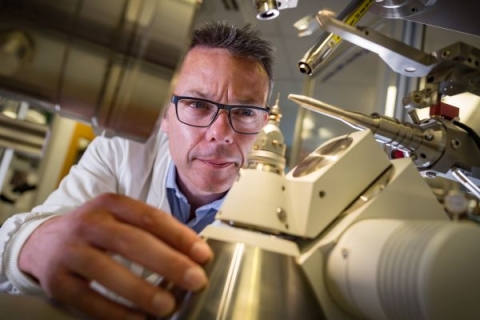

The report includes Diamond's work with the University to engineer an enzyme that can digest one of our most commonly polluting plastics.
27 May 2021
3 min read
The University of Portsmouth’s pioneering enzyme research features in a new study that estimates a monetary impact of at least £1.8 billion on UK science and economy from the UK’s synchrotron, Diamond Light Source.
The study, published by Diamond and Technopolis, set out to measure and demonstrate Diamond’s scientific, technological, societal, and economic benefits. The report summarises the findings and highlights the significant impact it has achieved to date, including its work with the University to engineer an enzyme that can digest one of our most commonly polluting plastics, polyethylene terephthalate (PET).
The Portsmouth team, led by Professor John McGeehan, collaborated with scientists at Diamond to help tailor the enzyme for use in large-scale industrial recycling processes. Shaped like a huge ring, the synchrotron works in a similar way to a microscope and uses intense beams of X-rays 10 billion times brighter than the Sun, which is then directed off into 33 laboratories known as ‘beamlines’.
Our long-term partnership with scientists at Diamond has been instrumental in our enzyme engineering work and we look forward to working together to develop new enzymes that can help to biologically recycle a wide range of polluting plastics.
Professor John McGeehan, Director of the Centre for Enzyme Innovation
Using the 123 beamline, an ultra-high-resolution 3D model of the PETase enzyme was generated in exquisite detail allowing the Portsmouth team to see the inner workings of the biological catalyst and providing them with the blueprints to engineer a faster and more efficient enzyme.
Professor McGeehan, Director of the University’s Centre for Enzyme Innovation, said: “We are excited to be part of this study which demonstrates the incredible value of our world-leading UK facilities. Our long-term partnership with scientists at Diamond has been instrumental in our enzyme engineering work and we look forward to working together to develop new enzymes that can help to biologically recycle a wide range of polluting plastics.”
Chief Executive of Diamond, Professor Andrew Harrison OBE, said; “Diamond’s mission is to keep the UK at the forefront of scientific research. We do this by providing our users in academia and industry access to our state-of-the-art facilities enabling them to fulfil their research goals across a wide variety of scientific disciplines. This report illustrates the fantastic benefits the facility has delivered and brilliant science being achieved by our 14,000-strong user community, who are tackling some of the most challenging scientific questions of the 21st century. We are so grateful to our funding agencies UKRI’s STFC and the Wellcome for their trust and ongoing support.”
Funded by the UK Government through the Science and Technology Facilities Council (STFC), and by the Wellcome Trust, Diamond is one of the most advanced scientific facilities in the world, and its pioneering capabilities are helping to keep the UK at the forefront of scientific research.
